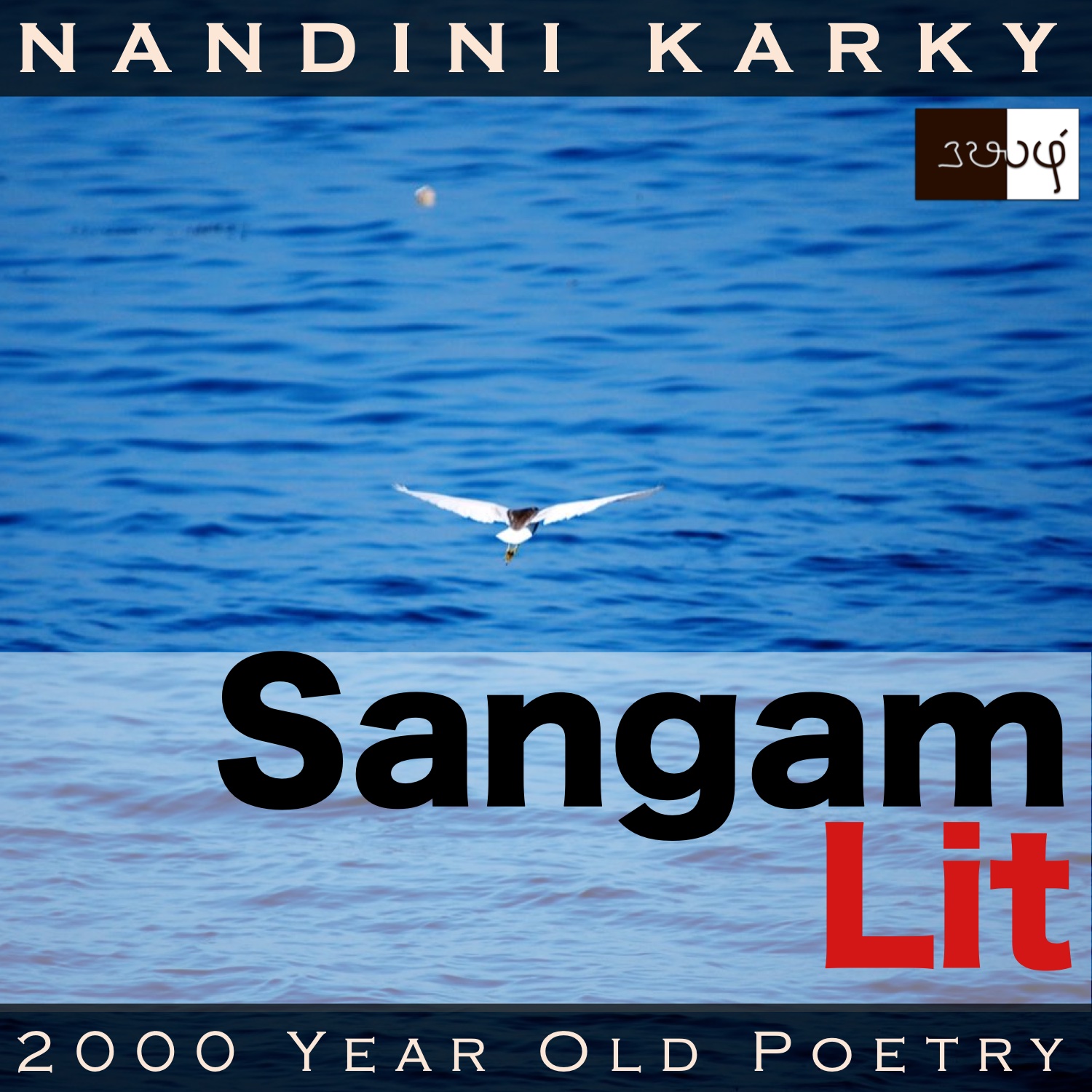Podcast: Play in new window | Download
Subscribe: Apple Podcasts | Spotify | Amazon Music | Android | iHeartRadio | Email | TuneIn | RSS | More

In this episode, we observe a curious technique of persuasion, as portrayed in Sangam Literary work, Kurunthogai 246, penned by Kabilar. Set in the coastal regions of ‘Neythal’, the verse speaks in the voice of the lady to the confidante, passing on a hidden message to the man, listening nearby.
”பெருங் கடற் கரையது சிறு வெண் காக்கை
களிற்றுச் செவி அன்ன பாசடை மயக்கி,
பனிக் கழி துழவும் பானாள், தனித்து ஓர்
தேர் வந்து பெயர்ந்தது” என்ப. அதற்கொண்டு,
ஓரும் அலைக்கும் அன்னை; பிறரும்
பின்னு விடு கதுப்பின் மின் இழை மகளிர்
இளையரும் மடவரும் உளரே;
அலையாத் தாயரொடு நற்பாலோரே.
‘Ah! The lucky others’, sighs a voice in this verse. In the opening words ‘பெருங் கடற் கரையது சிறு வெண் காக்கை’ meaning ‘on the great seashore, a small white gull’ etches the contrast in the size of the land and the life therein. The phrase ‘களிற்றுச் செவி அன்ன பாசடை’ meaning ‘green leaf akin to an elephant’s ears’ most probably talk about the leaf of a lotus plant that frequents this region. ‘பானாள்’ gives indicator of the time of day for it means ‘midnight’. In ‘ஓரும் அலைக்கும் அன்னை’ meaning ‘mother, who thinks a lot and torments me’, an interesting sketch of a mother is presented. ‘Maiden who have long plaited tresses and who wear radiant jewels’ are depicted in ‘பின்னு விடு கதுப்பின் மின் இழை மகளிர்’. Ending with the words ‘அலையாத் தாயரொடு நற்பாலோரே’ meaning ‘those with mothers who torment not; those of good destiny’, the verse intrigues our curiosity.
All about the torment of mothers, looks like! The context reveals that the man and lady were leading a love relationship and the man was trysting with the lady by night for a while. One night, when he arrives near the lady’s house, pretending not to notice him, but making sure he’s in earshot, the lady says to her confidante, “‘The little white sea gull in the huge seashore, ruffles green leaves, akin to elephant ears, and searches in the cold backwaters at midnight. At this time, a lonely chariot came and departed’, they seem to have said. From that point, pondering over it, mother has started hassling me. There are other maiden with plaited, long tresses and shining jewels, those who are young and naive. But, they seem to have mothers who don’t harass them so. Blessed are they!”. With these words, the lady conveys to the listening man, the dangers in the nightly tryst, and in a subtle manner, persuades him to seek her hand in marriage.
What could be the danger the lady means? Let’s explore by listening to her words closely. The lady starts with the words of others, who seem to have remarked about the dark of the night, when little gulls on the huge shore are searching for prey by shaking leaves looking like elephant ears and sending ripples in the water. The reason for their reference being that at that late hour, they have seen a chariot arriving there and leaving shortly afterward. After those mischievous people have sown the information in mother’s mind, she seems to be pondering over it and then asking pointed questions to the lady, much to her annoyance. The lady then remarks to her confidante there are other girls, young and naive maiden, who have long tresses and wear glowing jewels but their mothers are not like hers and those mothers seem to leave their girls in peace. She concludes saying that they must be have born lucky!
A classic case of the ‘grass is greener on the other side’! By talking about other mothers who are kinder and her own, who seems to be digging up too much, the lady presents the danger of confinement looming ahead, and hints to the man that he better give up temporary trysting and take steps towards a permanent union. Reverting to the core thought, don’t our friends’ mothers seem so kind and thoughtful, especially when we are at odds with our own? This verse clicked personally and made me smile for it reminded me of how when he wants more screen time, my son casually talks about how some of his friends’ moms place no restrictions on screen time at all. I find it absolutely stunning that an ancient verse captures this subtle dynamic in parent-child relationship, that can be related to, even today!




Share your thoughts...